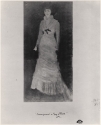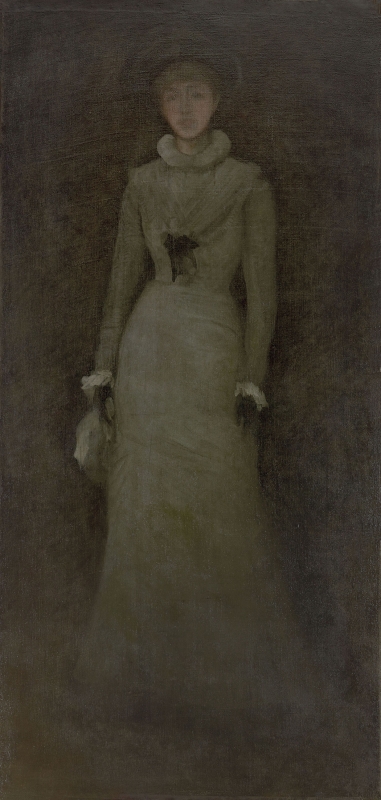A portrait of Florence Leyland (1859-1921) may have been started in the early 1870s, but then destroyed or abandoned. Instead, a painting of another model, painted in the late 1870s, was reworked and became the extant Portrait of Miss Florence Leyland, which was completed in or by 1884. 1 In other words, a portrait of Florence Leyland may have been started on one canvas, and completed on another. Its history is, to say the least, confusing.
1871: Whistler was at Speke Hall, near Liverpool, from October-November 1871, painting a portrait of Frances Leyland (1834-1910) (Symphony in Flesh Colour and Pink: Portrait of Mrs Frances Leyland [YMSM 106]). On 29 November, Whistler's mother, Anna Matilda Whistler (1804-1881), wrote 'Mrs Leyland writes me of the Portrait he is taking of her that it is as life like as all think mine! It is life size & so is another of one of her daughters.' 2 At this point, Mrs Leyland's daughter Florence would have been barely twelve years old, and it is not certain she was the sitter in question.
1872-1874: According to Whistler's biographers, the Pennells:
'At this same time Mr. Leyland gave Whistler commissions to paint his four children, Mrs. Leyland and himself. ... The big canvases travelled with him, backward and forward, between Speke Hall and London, and the sittings were continued in both places. They all sat to him. The children hated posing as much as they delighted in Whistler.' 3
It is likely that Florence was posing by about 1873, when Whistler drew the designs for a dress illustrated above: Florence Leyland in a green and orange dress [M.0523] and Florence Leyland in a purple dress [M.0524]. Florence was almost certainly posing in September 1874 when Whistler's mother wrote, 'Jemie is now painting portraits at Speke Hall of two youthful daughters of the Leylands.' 4
1875: In May Whistler was staying with the Leylands at Speke Hall. On 12 May his mother wrote to Mrs Leyland:
'I hope my dear Jemie may soon finish the portraits at the Hall & be permitted to come home to work as he has been doing this week. Beg Elinor in pity to my loneliness to encourage & help the Artist, I know she is weary of him & of posing, but I am sure she & Flo & Jamie will be as anxious as we all are to have their likeness perfected.' 5
In September Whistler's mother reported: 'Jemie is rather closely confined to his Studio tho he has changes of scene & air at Speke Hall ... where he paints Portraits, as is now the case, at Speke, this bright & warmest season of our Summer.' 6
1876-1877: According to the Pennells, the sitter remembered that she had posed when she was seventeen or eighteen (that is, between 1876 and 1877). 7
1877: The portrait of Florence was incomplete at the time of Whistler's quarrel with her father, Frederick Richards Leyland (1832-1892) . On 25 July 1877 Whistler drafted a letter to Leyland: 'A third portrait [for which you have paid me] needs further sittings - it is for you to determine whether it shall be completed or whether you shall receive it as it is.' 8 Leyland replied sarcastically:
'I quite appreciate your "artistic scruples" to deliver the two portraits which you consider finished and I must say these scruples are uncommonly well founded. I am however willing to receive them as they are, as also the third portrait in its unfinished state.' 9
1878: Walter Theodore Watts-Dunton (1832-1914) intervened, stating, 'All that Mr Leyland asks for are his naked rights and I cannot, notwithstanding your letter, think that you wish to withhold from him the property he has bought and paid for.' 10 Whistler responded,
'With reference to the portrait of Miss Florence Leyland I have to say that it is incomplete simply because the young lady has not sufficiently sat for it - and as she is not to sit for it again, I must do what I can to make it as worthy of me as possible - When this is all accomplished, Leyland shall have it - for my "stock in trade" is my reputation, and it is not represented by Leyland's money.' 11
However, Whistler may have abandoned the first portrait of Florence Leyland at this time.
In November 1878, during the Whistler v. Ruskin trial, Whistler stated that he had painted over a portrait that had been recently exhibited as 'Harmony in Amber and Black', 'with a view to alter it and change its character as a picture. It is in a transition state.' 12
The face of the model in 'Harmony in Amber and Black' may have been reworked to look like a portrait of Florence Leyland, and became the portrait under discussion here, Portrait of Miss Florence Leyland [YMSM 107].
1879: The Pennells suggested that a canvas containing a portrait of Florence Leyland, possibly in a rubbed down condition, could have been acquired by a creditor, Thomas Way (1837-1915), at the time of Whistler's bankruptcy in 1879, but later returned to Whistler. 13
1879/1881:

'Arrangement in Grey and Black, No. 2', photograph signed ca 1881 Baltimore Museum of Art, 33.53.9055
Walking dresses in the fashions of 1878/1879 are compatible with the dress worn by Maud Franklin (1857-ca 1941) in the painting seen in the photographs above, one of which was signed ca 1881 and inscribed ' ["]Arrangement in Grey and Black." No 2.' This portrait was apparently painted over. A portrait of Florence Leyland, in a slightly altered dress, appears to have been superimposed on the portrait of Franklin. It is in this revised version that the extant portrait, Portrait of Miss Florence Leyland [YMSM 107], has survived.
1884: On 26 March 1884 Alan Summerly Cole (1846-1934) noted in his diary that he had visited Whistler in Tite Street and found him 'Painting (full length) portrait of girl with a round black hat', which might have been the portrait as it was in progress. 14 Jacques Émile Blanche (1861-1942) saw 'les Leyland', a series of arrangements 'en noir et brun' at Whistler's Tite Street studio about 1884. 15 These may have been Arrangement in Black: Portrait of F. R. Leyland [YMSM 097] and the Portrait of Miss Florence Leyland. Both portraits were probably sent to F. R. Leyland at this time.
Notes:
1: See YMSM 1980 [more] (cat. no. 107).
2: A. M. Whistler to J. H. Gamble, GUW #06547.
3: Pennell 1908 [more] , vol. 1, pp. 175-76.
4: A. M. Whistler to M. E. H. Eastwick, 8. 9, 23 and 29 September 1874, GUW #11843.
5: A. M. Whistler to F. Leyland, 12 May [1875], GUW #08181; see Merrill 1998 [more] , p. 141.
6: A. M. Whistler to J. H. and H. Gamble, 9-20 September 1875, GUW #06555.
7: Pennell 1921C [more] , p. 105.
10: 1 February 1878, GUW #06072.
11: Whistler to Watts-Dunton, 2 February [1878], GUW #09577.
12: Merrill 1992 [more] , pp. 146-47.
13: Pennell 1921C [more] , p. 135.
Last updated: 30th December 2020 by Margaret









